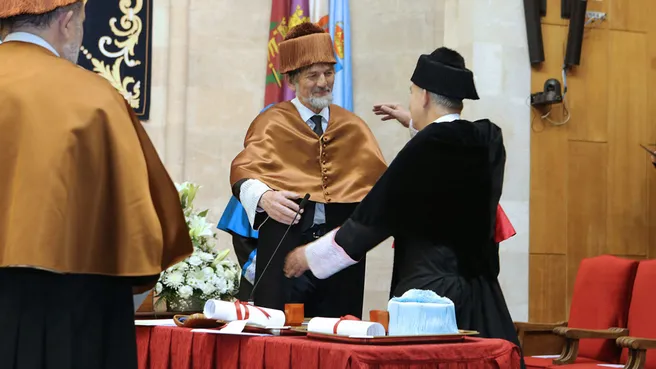Over 200 guests attended the ceremony, which was chaired by Rector Antonio Largo. Hans Pretzsch is not only personally delighted about receiving an honorary doctorate, but also about the recognition of his field of research. “Forestry sciences are usually the 'underdogs' of the modern scientific world, just like agricultural sciences. To be honored here alongside personalities from the fields of political science, literature and physics such as Josep Borrell, Mario Vargas Llosa and Ilya Prigogine makes me particularly happy,” he explained in his inaugural speech.
Felipe Bravo, Professor of Forest Management, Director of the SMART Global Ecosystems Chair at Valladolid and former President of the Spanish Society of Forest Sciences, emphasized in his laudatory speech that Hans Pretzsch is one of the most important researchers in the field of forest science in the 21st century. “His academic focus is on analyzing the patterns and processes of forest ecosystems in order to improve people's quality of life,” explained Felipe Bravo. Prof. Pretzsch has successfully combined science and practice in a series of high-profile research papers and publications, drawing on his resources at TUM, among others, according to Bravo.
Active in research and teaching across six continents
“He has repeatedly been recognized as one of the world's most cited researchers and also supports political decision-making in the forestry sector,” the laudator emphasizes. Pretzsch's academic activities, including conducting courses, seminars and research projects, span six continents. “His work is particularly significant in Eastern Europe, including Poland, the Czech Republic, Slovakia, Slovenia and Bulgaria, as well as in Australia, South and North America, especially Canada (British Columbia, Alberta and Quebec) and the USA (Arizona, Pennsylvania and Connecticut). In Asia he has worked in China and Vietnam, in Africa in South Africa and finally in Europe in Spain, where he collaborates with groups from the CSIC in Madrid and the University of Valladolid. Professor Pretzsch's inspiration, drive and coordination led to the creation of the first mixed forest monitoring network in Europe, made possible by his collaboration with a broad network of researchers from almost all European countries.” laudator Felipe Bravo lists the diverse international projects of the TUM Emeritus of Excellence.
Promoting diversity on a plant basis
In his Lectio Magistralis, Hans Pretzsch addressed the topic of „Integrative Ecosystem Management through the Diversification of Structure and Tree Species“. On the day before the ceremony, an international scientific symposium on „Promoting Diversity in Plant-Based Ecosystems as Tool for Ecosystem Services Provision“ was held in the presence of Professor Pretzsch.
About the person: Prof. Dr. Dr. h.c. mult. Hans Pretzsch
Hans Pretzsch, born in Düsseldorf in 1957, studied forest science and biostatistics at the Ludwig Maximilian University of Munich and the Albert Ludwig University of Freiburg from 1977 to 1982, graduating with a degree in forest science. After completing his doctorate at the LMU Munich in 1985, he worked there as a research assistant, also at the Faculty of Forest Science. From 1989 to 1992, he completed his habilitation with venia legendi in the subjects of “Forest Growth, Biometry and Modeling”. From 1992, he was head of the Forest Growth Department at the Northwest German Forest Research Institute in Göttingen. From 1994, he was head of the Chair of Forest Growth Science, first at the Ludwig Maximilian University of Munich and then at the Technical University of Munich, where he retired as Emeritus of Excellence in September 2023.
His research focuses on the laws of growth in pure and mixed stands at tree and stand level, tree and stand growth under stress and the modeling of processes and structures. His contributions to mixed stand research and the development and establishment of forest growth models in science and practice are trend-setting. Hans Pretzsch also promotes the consistent expansion of the traditional Bavarian experimental plot network, especially with regard to tree species mixtures, and promotes cross-scale, integrative research into forest growth, which extends from the leaf to the tree to the stand and from the landscape to the urban level in a changing environment.
